Background
Ivelaw Lloyd Griffith was born on August 19, 1955, in Guyana.

Turkeyen Campus, Georgetown, Guyana
University of Guyana
Brooklyn & Brookville, New York, United States
Long Island University
365 5th Ave, New York, NY 10016, United States
Graduate Center, City University of New York, Master of Philosophy
94-20 Guy R Brewer Blvd, Jamaica, NY 11451, United States
York College, City University of New York
1005 State University Dr, Fort Valley, GA 31030, United States
Fort Valley State University (logotype)






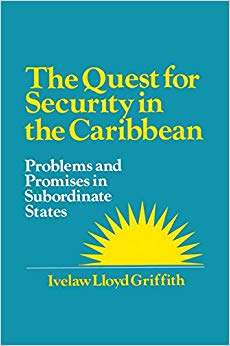
(This comprehensive work on security in the English-speaki...)
This comprehensive work on security in the English-speaking Caribbean, offers a wealth of information about the history, politics, economics and geography of the entire region. The author examines security problems in the region as a geopolitical unit, not on a selective case-study basis, as is usually done. He assesses Caribbean security within a theoretical framework where four factors are critical: perceptions of the political elites; capabilities of the states; the geopolitics of the area; and the ideological orientations of the parties in power. Political and economic issues are judged to be as relevant to security as military factors. The author identifies safeguards which countries in the region may take in the coming decade.
http://www.amazon.com/gp/product/B00ZG956QI/?tag=2022091-20
1993

(Drugs and Security in the Caribbean is a comprehensive st...)
Drugs and Security in the Caribbean is a comprehensive study of the drug dilemma in the Caribbean that reveals the severity of the threat illegal drug trafficking poses to the small countries of that region. The illegal drug traffic in the Caribbean is a persistent problem for law enforcement in the United States, but for small countries in that region it threatens their very existence. The increase in the production and flow of drugs undermines the political stability and economic development because it leads to crime, corruption, and arms trafficking and affects tourism. And although all these countries, except Cuba, are democracies, the need to commit military and paramilitary forces in the war against drugs can seriously undermine democratic governance in those nations. Ivelaw Griffith has undertaken the first extensive study of illegal drugs in the Caribbean by examining the nature and scope of drug operations, probing the security implications of those operations and the problems they cause, and assessing countermeasures for dealing with drug traffic and resulting problems. By disclosing the various elements of the drugs-security matrix, Griffith argues that the sovereignty of Caribbean countries is under siege, not only from drug operators but also from other states, owing to the transnational nature of drug trafficking and the inability of most small countries to cope with it. Drugs and Security in the Caribbean makes it clear that there is no simple solution to the drug threat. As long the demand for drugs persists in the United States and Europe, drug trafficking in the Caribbean will be nearly impossible to control. Included in the book are two appendixes: the first is the 1996 anti-drugs treaty between the U.S. and Trinidad and Tobago, a model for agreements signed with other countries; the second is a Caribbean Counternarcotics "Who's Who."
http://www.amazon.com/gp/product/0271017198/?tag=2022091-20
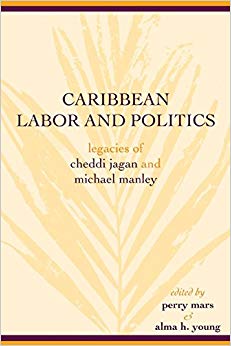
(Having more in common than their deaths on the same day i...)
Having more in common than their deaths on the same day in 1997, the late Cheddi Jagan of Guyana and Michael Manley of Jamaica both represented a radical perspective in modern Caribbean politics. Jagan and Manley each had a bold and creative ability to connect labor and politics and made it their priority to minimize poverty and inequality and to enhance the welfare of the Caribbean's disadvantaged and dispossessed. Caribbean Labor and Politics looks closely at the legacies of Jagan and Manley and their ramifications for the political and economic struggles of the Caribbean region and the world. This edited volume brings together a variety of studies on the lives, works, and intellectual and practical contributions of these two stalwart political leaders. The chapters focus primarily on Jagan's and Manley's years as heads of state of their respective countries and also encapsulate their pre-political years-mainly their growing-up experiences and their organizational work in the labor movement. The core contributions of these men are characterized in terms of their pivotal struggles towards the realization of what we term the "working class project."
http://www.amazon.com/gp/product/0814332110/?tag=2022091-20
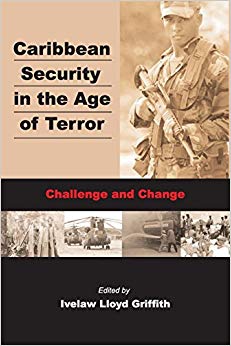
(The security issues which have come into prominence since...)
The security issues which have come into prominence since the September 11 terrorist attack in the USA provide both the starting point and the focus for this comprehensive survey of contemporary security issues in the Caribbean. This volume assesses the impact of the 9/11 terrorist attack on Caribbean states and examines the institutional and operational terrorism response capacity of security agencies in the region. However, understanding security challenge and change in the Caribbean context requires a broad-based multidimensional approach; terrorism for the small, open and vulnerable nation states of the Caribbean region is a real security issue but even more so, is a range of untraditional threats like crime, drug trafficking, territorial disputes, environmental degradation and the rapid spread of the HIV/AIDS epidemic. How these states adapt policies and practices to adjust to the new regional and global circumstances represent the challenge and the change.
http://www.amazon.com/gp/product/9766371423/?tag=2022091-20
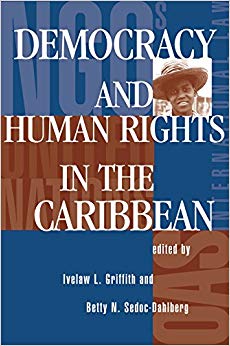
(The Caribbean, like regions elsewhere, is caught in what ...)
The Caribbean, like regions elsewhere, is caught in what has been called democracy's global ?Third Wave.? In this volume, contributors examine the nature of democratization in the region together with its accessory, human rights. The emphasis is to extend the analysis and debates beyond political democracy and civil and political rights to consider also economic democracy and economic and social rights. Early chapters address issues and dilemmas common to the democracy and human rights landscape throughout the region. In particular, economic crisis, drug trafficking, and political instability continue to threaten the region's relatively healthy human rights profile. Next, contributors consider how the form of Caribbean democracy and the status of human rights have been influenced by foreign actors and external developments. Particular attention is paid to the role of the OAS, the United Nations, NGOs, and international law. Because the democracy and human rights challenges and dynamics vary across countries, the work also offers extensive single-country assessments.
http://www.amazon.com/gp/product/B079TT9F73/?tag=2022091-20
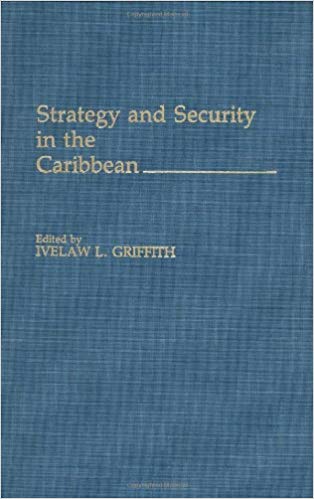
(This contribution to the debate on security in the Caribb...)
This contribution to the debate on security in the Caribbean highlights the security problems of small states. The contributors analyze internal and external security issues, military, political, and economic influences, and security initiatives and policies from indigenous, regional, and extra-regional perspectives. They also present empirical case studies of four English-speaking nations. The volume begins by introducing the dynamics influencing Caribbean security: leadership, history, geopolitics, and internal political violence. Part Two then presents four case studies: Barbados, Guyana, the Virgin Islands, and the Belize-Guatemala territorial dispute. Realist theory, conflict theory, political economy, and political psychology are among the theoretical frameworks represented in these essays. Focusing particularly on the English-speaking Caribbean, the authors examine the resources, institutions, economies, geopolitics, internal instability, militarization, and intervention shaping the security environment. This work is an important resource for scholars and policy analysts of military/security issues, the Caribbean/Latin America, and Third World development.
http://www.amazon.com/gp/product/B001EYTGNS/?tag=2022091-20
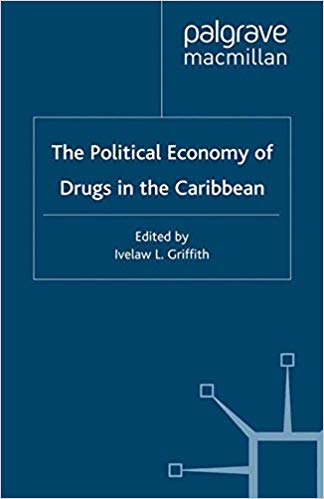
(This volume does four things. Firstly it examines the nex...)
This volume does four things. Firstly it examines the nexus between the illegal narcotics enterprise as a social phenomenon and political economy as a scholarly issue area. Secondly it explores the regional and global contexts of the political economy of illegal narcotics operations in the Caribbean. Thirdly it assesses some of the political economy connections and consequences of the enterprise in the region. Finally, it discusses some of the measures adopted to contend with the illegal drug challenge in the area.
http://www.amazon.com/gp/product/1349402664/?tag=2022091-20
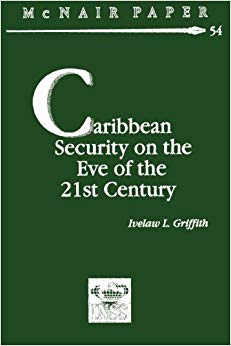
(As the 21st century approaches, the international communi...)
As the 21st century approaches, the international community continues to grapple with the consequences of major shifts in the security environment. The world we now live in is a paradox: political integration and community fragmentation; expanding transnationalism and rising nationalism; unimaginable wealth and unspeakable poverty, high-tech militarizes and low-tech conflicts, decreasing military spending and expanding use of defense resources. In this complex environment, the United States is debating its global role and security priorities for the 21st century.
http://www.amazon.com/gp/product/1478214023/?tag=2022091-20
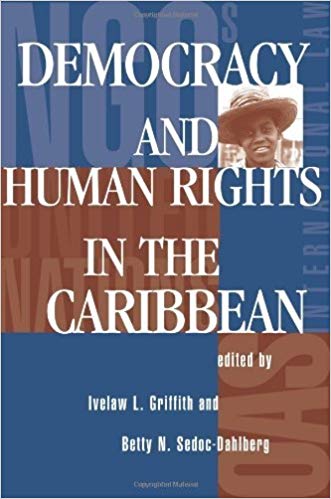
(Will be shipped from US. Used books may not include compa...)
Will be shipped from US. Used books may not include companion materials, may have some shelf wear, may contain highlighting/notes, may not include CDs or access codes. 100% money back guarantee.
http://www.amazon.com/gp/product/B0118305EI/?tag=2022091-20
Ivelaw Lloyd Griffith was born on August 19, 1955, in Guyana.
Griffith graduated from the University of Guyana with honors as a Bachelor of Science in 1980, he got a Diploma in Communication from that university a year later. Then he moved to the Long Island University and obtained Master of Arts degree from it in 1984. He also attended Graduate Center of the City University of New York, becoming Master of Philosophy in 1989, and, finally, Doctor of Philosophy next year.
During his early career, Griffith held such posts as an associate professor of political science at the Florida International University, he was a member of Peace and Security in the American Network of the Woodrow Wilson International Center for Scholars. He also served as a consultant at such organizations as Ford Foundation at the U.S. Department of State, the Inter-American Defense Board, the Canadian Department of Foreign Affairs and the International Trade.
Griffith served as provost at Radford University. He worked as a provost and senior vice president at York College of the City University of New York from 2007. On July 22, 2013, he was appointed as the ninth president of the Fort Valley State University by the Board of Regents of the University System of Georgia. Professor Griffith has served as the 10th Vice-Chancellor of the University of Guyana since June 14, 2016.
He is also a specialist on Caribbean security, drugs and crime. At that position, he has been a consultant to Canada’s Ministry of Foreign Affairs and International Trade, the United States Agency for International Development (USAID) and other organizations. He also has spoken at military academies across the United States and in the Caribbean. Now he serves on the editorial board of the journal Security and Defense Studies Review, which is published by the Center for Hemispheric Defense Studies, in Washington.
In addition, he has worked as a visiting scholar at the Center for Hemispheric Defense Studies, the Royal Military College of Canada and the George Marshall European Center for Security Studies in Germany.
He has written several books and a great number of articles. Currently, he works on the Vestry of the St. Georges Episcopal Church in Long Island, and on the board of directors of the Jamaica Center for Arts and Learning in Queens, New York.
Griffith held significant positions of a provost and senior vice president at several educational institutions. He is now the 10th Vice-Chancellor of the University of Guyana. Griffith is the first person in the University of Guyana’s history to graduate with Distinction in Political Science in 1980. He has achieved an outstanding record as a scholar, academic leader and teacher.
He got John D. and Catherine T. MacArthur Foundation grant in 1993.
(The security issues which have come into prominence since...)
(Drugs and Security in the Caribbean is a comprehensive st...)
(Having more in common than their deaths on the same day i...)
(This comprehensive work on security in the English-speaki...)
1993(As the 21st century approaches, the international communi...)
(This contribution to the debate on security in the Caribb...)
(The Caribbean, like regions elsewhere, is caught in what ...)
(This volume does four things. Firstly it examines the nex...)
(Will be shipped from US. Used books may not include compa...)
Griffith is a member of the International Studies Association, the Latin American Studies Association and the Caribbean Studies Association.
Quotes from others about the person
“The University of Guyana welcomes Professor Ivelaw Griffith whose scholarly achievements and leadership experience are well suited to the central role he must play in transforming the institution.” - Chancellor Nigel Harris
Griffith married Francille W. on December 26, 1987. The couple has 2 children - Shakina Aisha and Ivelaw Lamar.
